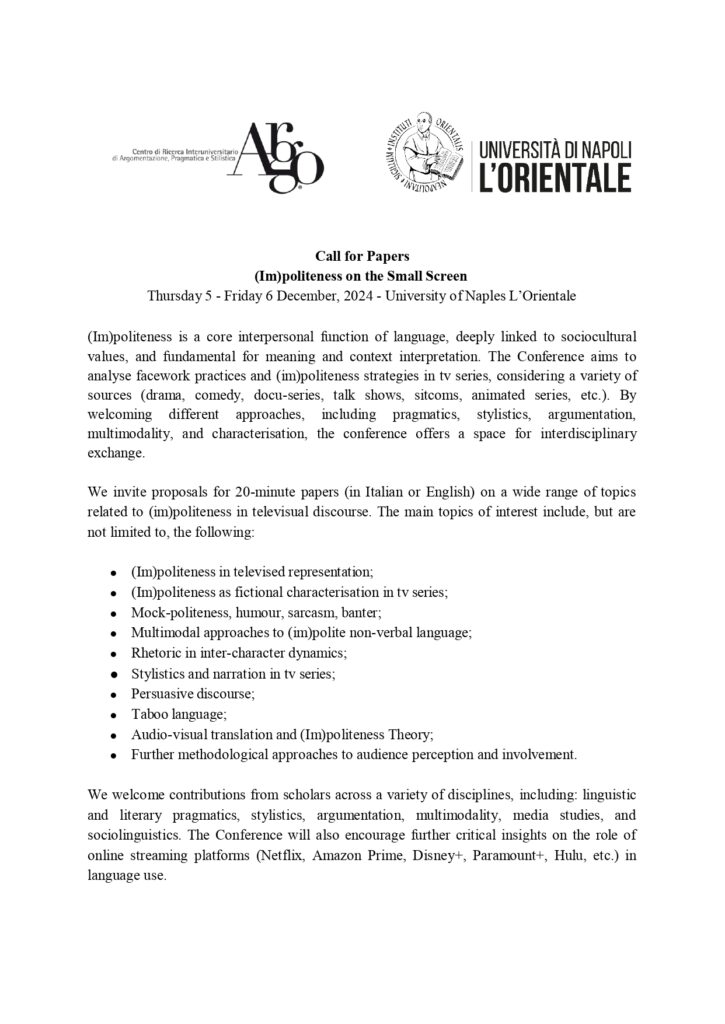Cfp: (Im)politeness on the Small Screen (Thursday 5 – Friday 6 December, 2024, University of Naples L’Orientale)
CALL FOR PAPERS: (Im)politeness on the Small ScreenThursday 5 – Friday 6 December, 2024University of Naples L’Orientale (Im)politeness is a core interpersonal function of language, deeply linked to sociocultural values, and fundamental for meaning and context interpretation. The Conference aims to analyse facework practices and (im)politeness strategies in tv series, considering a variety of sources (drama, comedy, docu-series, talk shows, sitcoms, animated series, etc.). By welcoming different approaches, including pragmatics, stylistics, argumentation, multimodality, and characterisation, the conference offers a space for interdisciplinary exchange. We invite proposals for 20-minute papers (in Italian or English) on a wide range of topics related to (im)politeness in televisual discourse. The main topics of interest include, but are not limited to, the following:● (Im)politeness in televised representation;● (Im)politeness as fictional characterisation in tv series;● Mock-politeness, humour, sarcasm, banter;● Multimodal approaches to (im)polite non-verbal language;● Rhetoric in inter-character dynamics;● Stylistics and narration in tv series;● Persuasive discourse;● Taboo language;● Audio-visual translation and (Im)politeness Theory;● Further methodological approaches to audience perception and involvement. We welcome contributions from scholars across a variety of disciplines, including: linguistic and literary pragmatics, stylistics, argumentation, multimodality, media studies, and sociolinguistics. The Conference will also encourage further critical insights on the role of online streaming platforms (Netflix, Amazon Prime, Disney+, Paramount+, Hulu, etc.) in language use. Abstracts should not exceed 300 words and sent as email attachments in .doc or .docx format to c.ghezzi@unior.it and r.esposito12@unior.it by 21/06/2024. 21/07/2024 Proposals should include:– full name;– academic position;– affiliation;– email address;– keywords (5 max.)– references (5 max.) Notice of acceptance will be sent by 31/07/2024.Following the Conference, authors will be invited to publish their papers in a collection of essays. Organising and Scientific CommitteeChiara Ghezzi (University of Naples L’Orientale) Roberto Esposito (University of Naples L’Orientale) Selected bibliographyAttardo, Salvatore. 2017. “Humour and Pragmatics”. In The Routledge Handbook of Language and Humor, edited by S. Attardo, 174-188. New York: Routledge.Brown, Penelope, and Stephen C. Levinson. 1987. Politeness: Some Universals in Language Usage. Cambridge; New York: Cambridge University Press.Culpeper, Jonathan. 1996. “Towards an Anatomy of Impoliteness”. Journal of Pragmatics25(3):349–67.Culpeper, Jonathan. 2001. Language and Characterisation: People in Plays and Other Texts.Harlow England, New York: Longman.Culpeper, Jonathan. 2011. Impoliteness: Using Language to Cause Offence. Cambridge University Press.Culpeper, Jonathan, Michael Haugh, and Daniel Z. Kádár. (Eds.) 2017. The Palgrave Handbook of (Im)politeness. Basingstoke: Palgrave MacMillan.Culpeper, Jonathan. 2019. “Taboo language and impoliteness”. In Oxford Handbook of TabooWords and Language, edited by K. Allan, 28-40. New York: Oxford University Press.Desilla, Louisa. 2019. “Pragmatics and Audiovisual Translation”. In The Routledge Handbook of Audiovisual Translation, edited by L. Pérez-González, 242-259. Oxon: Routledge.Dynel, Marta. 2016. “Conceptualizing Conversational Humour as (Im)Politeness: The Case of Film Talk”. Journal of Politeness Research 12 (1): 117–47.Hoffman, Christian, and Monica Kirner-Ludwig. (Eds.) 2008. Telecinematic Stylistics. London: Bloomsbury.Jacobs, Jason, and Steven Peacock. (Eds.) 2013. Television Aesthetics and Style. London: Bloomsbury.Kádár, Dániel Z., and Michael Haugh. 2013. Understanding Politeness. Cambridge: Cambridge University Press.Kress, Gunther, and Theo van Leeuwen. 2006. Reading Images: The Grammar of Visual Design. Second Edition. London: Routledge.Locher, Miriam A., and Andreas H. Jucker. (Eds.) 2017. Pragmatics of Fiction. Berlin; Boston: De Gruyter.Nørgaard, Nina. 2010. “Multimodal Stylistics: the Happy Marriage of Stylistics and Semiotics”. In Semiotics: Theory and Applications, edited by S. C. Hamel, 255-260. Nova Science Publishers.Perelman, Chaim, and Lucie Olbrechts-Tyteca. 1973. The New Rhetoric. A Treatise on Argumentation. Notre Dame; London: University of Notre Dame Press.Shardakova, Maria. “Politeness, Teasing and Humour”. 2017. In The Routledge Handbook of Language and Humor, edited by S. Attardo, 219-233. New York: Routledge.Simpson, Paul, and Derek Bousefield. 2017. “Humour and Stylistics”. In The Routledge Handbook of Language and Humor, edited by S. Attardo, 158-173. New York: Routledge.Sorlin, Sandrine. (ed.) 2019. Stylistic Manipulation of the Reader in Contemporary Fiction. London: Bloomsbury.Talebzadeh, Hossenin, and Marzieh Khazraie. 2023. ““You can f*** get lost already”: (Responding to) impoliteness in the (in-)authentic discourse of comedy and crime TV series and movies”. Journal of Politeness Research 19 (2): 485-520.van Eemeren, Frans H., and Peter Houtlosser. 2005. Argumentation in Practice. Amsterdam and Philadelphia: John Benjamins Publishing Company

